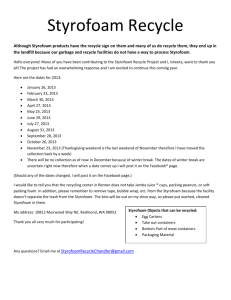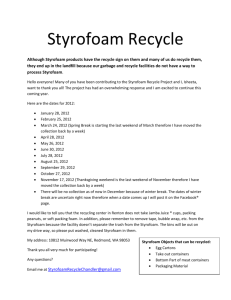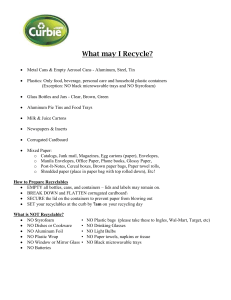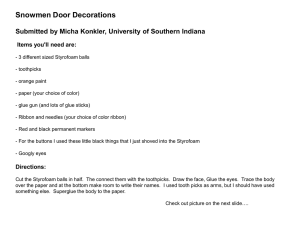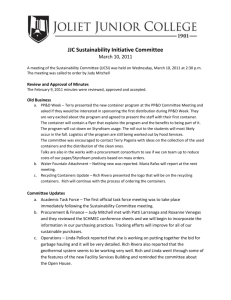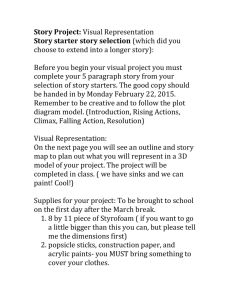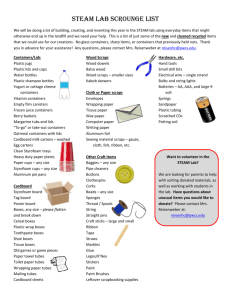Environmentally Friendly Takeout Containers
advertisement
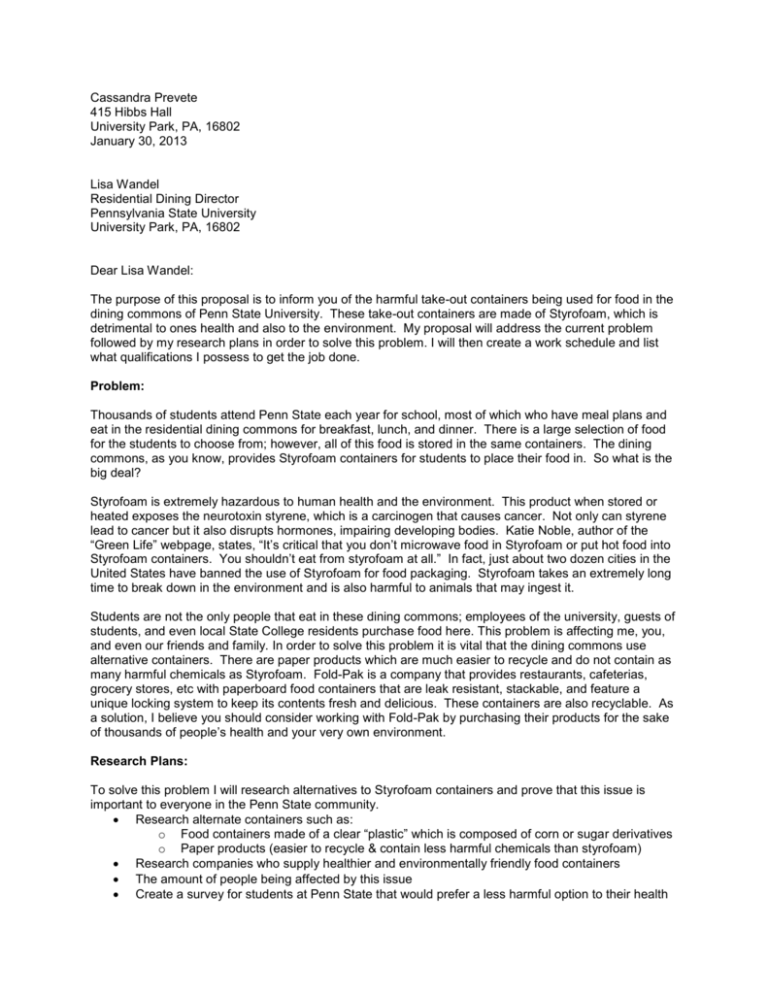
Cassandra Prevete 415 Hibbs Hall University Park, PA, 16802 January 30, 2013 Lisa Wandel Residential Dining Director Pennsylvania State University University Park, PA, 16802 Dear Lisa Wandel: The purpose of this proposal is to inform you of the harmful take-out containers being used for food in the dining commons of Penn State University. These take-out containers are made of Styrofoam, which is detrimental to ones health and also to the environment. My proposal will address the current problem followed by my research plans in order to solve this problem. I will then create a work schedule and list what qualifications I possess to get the job done. Problem: Thousands of students attend Penn State each year for school, most of which who have meal plans and eat in the residential dining commons for breakfast, lunch, and dinner. There is a large selection of food for the students to choose from; however, all of this food is stored in the same containers. The dining commons, as you know, provides Styrofoam containers for students to place their food in. So what is the big deal? Styrofoam is extremely hazardous to human health and the environment. This product when stored or heated exposes the neurotoxin styrene, which is a carcinogen that causes cancer. Not only can styrene lead to cancer but it also disrupts hormones, impairing developing bodies. Katie Noble, author of the “Green Life” webpage, states, “It’s critical that you don’t microwave food in Styrofoam or put hot food into Styrofoam containers. You shouldn’t eat from styrofoam at all.” In fact, just about two dozen cities in the United States have banned the use of Styrofoam for food packaging. Styrofoam takes an extremely long time to break down in the environment and is also harmful to animals that may ingest it. Students are not the only people that eat in these dining commons; employees of the university, guests of students, and even local State College residents purchase food here. This problem is affecting me, you, and even our friends and family. In order to solve this problem it is vital that the dining commons use alternative containers. There are paper products which are much easier to recycle and do not contain as many harmful chemicals as Styrofoam. Fold-Pak is a company that provides restaurants, cafeterias, grocery stores, etc with paperboard food containers that are leak resistant, stackable, and feature a unique locking system to keep its contents fresh and delicious. These containers are also recyclable. As a solution, I believe you should consider working with Fold-Pak by purchasing their products for the sake of thousands of people’s health and your very own environment. Research Plans: To solve this problem I will research alternatives to Styrofoam containers and prove that this issue is important to everyone in the Penn State community. Research alternate containers such as: o Food containers made of a clear “plastic” which is composed of corn or sugar derivatives o Paper products (easier to recycle & contain less harmful chemicals than styrofoam) Research companies who supply healthier and environmentally friendly food containers The amount of people being affected by this issue Create a survey for students at Penn State that would prefer a less harmful option to their health Products that are healthier, environmentally friendly, and similar in cost to Styrofoam containers; maybe even an option that’s less in cost compared to Styrofoam. Qualifications: Due to the fact that I was a part of a “Go Green” organization in my neighborhood, my experience enables me to be aware of products that are harmful to our environment when choosing a solution to this issue. That being said, with my knowledge I will be able to find a better option that is recyclable. Also with the help of my peer, Rachel Rosenthal (a nutrition/science major), I will be able to find the safest option for food containers so people’s health will not be at risk. Here at Penn State I am a math major and have always been good with numbers. With my mathematical and logistical skills I will be able to find a solution that not only betters people’s health and the environment but also is within the school’s budget. Schedule of Events: Week 1: January 28th - February 3rd Research where most students eat at Penn State Create a survey for students asking if they recycle, if they are aware of the risks of eating out of styrofoam and the harm it puts on the environment. o On the survey provide a brief description how styrofoam food containers can harm ones health and the environment Follow this description with a question asking if they would prefer an alternative to styrofoam containers. Print and distribute Week 2: February 4th – 10th Distribute surveys out during the week to students all over campus and in each dining hall Collect data and analyze Week 3: February 11th – 17th Research alternatives to styrofoam food containers Contact other universities and see if maybe there are using a better option in their cafeterias See what types of packaging containers restaurants in downtown state college are using Week 4: February 18th – 24th Research other companies like Fold-Pak (produce and cell high-quality, paperboard packaging solutions made from natural resources. These products are recyclable and 100% made in the USA) o See if Fold-Pak is the best company to work with or if there is one similar with better costs Week 5: February 25th – 3rd Find out Penn State’s budget for supplies in the dining halls o Weigh out prices of all different alternatives and companies found thus far while taking into consideration their benefits Create a graph depicting the risks of each container and the prices of each Week 6: March 4th – 10th Spring Break – no work. Week 7: March 11th – 17th Discuss with Lisa Wandel, all the options at hand and present to her all the research I have done Penn State University’s dining commons needs to switch their food containers to better Penn State’s community. With my qualifications I show that I am more than capable of finding the healthiest and affordable alternative to styrofoam containers. With your permission, I will be able to provide Penn Staters with a healthier life and a cleaner environment. Sincerely, Cassandra Prevete
